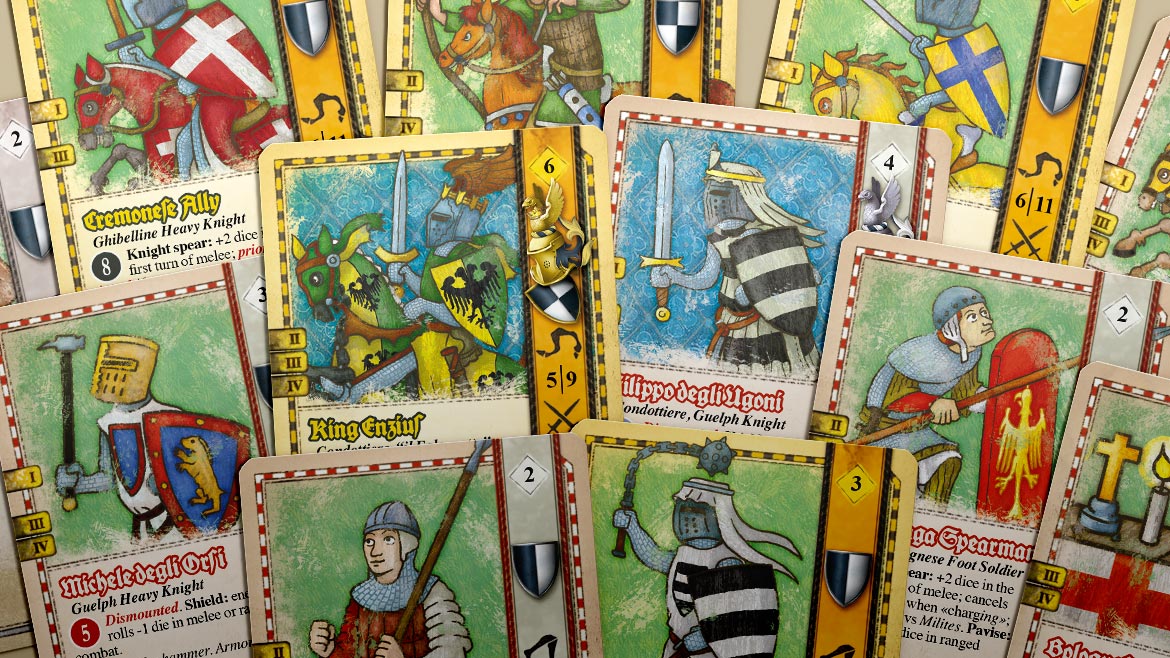The winning cards
In Ventura Battle System™, the tiles that move and fight on the battlefield are regulated by cards. Each card contains all the information a player needs to have on hand at all times to manage their Soldiers. Assimilate these few simple rules (there are only two phases in a game round) and you will never need to flip through the rulebook while playing.
Cards
Ventura Battle System™ is not the first and will not be the last game to have cards as components, but the peculiarity of the system developed by Sir Chester Cobblepot is how cards are used as an active element in game mechanics. Each player, in fact, manages their cards in "piles", a rather recurring keyword in The Fall of the King™'s glossary.
Piles
When you create Groups or Formations, just as tiles come into contact, cards form a pile. Card piles reflect the deployment on the battlefield, further simplifying management. At the top of each pile, a player must place the Soldier card with fewer Points to represent how everyone adjusts to their fellow soldier's limited skills to continue to act together.
Practicality
If the reason for this choice is not obvious, the designers explain that it is like the structuring of a convoy: the slowest vehicle dictates speed so as not to risk breaking up the whole convoy. This way you won't need to flip through the cards to move that Group, you just look at the top card, the others will follow accordingly. Simple and practical.
The Commander
When a pile represents a Formation, however, it is the Commander who must be placed at the top. A Constable, if the Condottiere is not there to personally lead it. The Commander always has superior characteristics compared to the Soldiers he is leading and such improved Formation performance represents military training and discipline. With a good leader, even the performance of individuals improves, don't you think?
Initiative
At the beginning of the battle, the number of piles that each player deploys is what decides who receives the Initiative token. In fact, the player with less piles receives it, because being better organized makes them more ready and reactive, of course. The Historical Scenarios of The Fall of the King™ were designed with this aspect in mind, but players are welcome to experiment with their own house-rules in complete freedom.
Activating a pile
During the second phase of the round, players take turns. During each turn you can declare the activation of one of your piles (we didn't specify this before, but a single soldier has a pile consisting of his own card and nothing else). A pile is activated by rotating it by ninety degrees. Obviously, an activated pile can no longer be chosen until it becomes available again in the next round.
Measurement
If the Action that has been declared with the activation also includes a measurement (e.g. a movement or taking a shot), it must be taken before proceeding. If everything checks out (each player acts as referee during the opponent's turn), any costs in markers are paid and the characteristics printed on the cards are applied.
Performance
Once the Action is completed, the pile must be adjusted to reflect the Soldiers' tiles on the battlefield. These procedures are the very heart of the system, keeping the situation constantly updated, turn after turn and round after round. A mechanism that simplifies access to information and speeds up the operations that players perform.
Milites
The cards of Milites, cavalry units, have the peculiarity of having their own Pedites version on their back. So, if a player wants to dismount a Soldier or his horse is felled in combat, they can simply flip the card and replace the tile (with its Pedites version) on the battlefield map.
The End of the Round
At the end of the round all activated piles, which have been rotated, become available for the next round (if any), to be activated again. Long-time wargamers may turn their noses up at the idea of mixing cards and "miniatures": if you're not open to experimenting with something different you may find it more difficult than expected, but rules are not the problem here.

